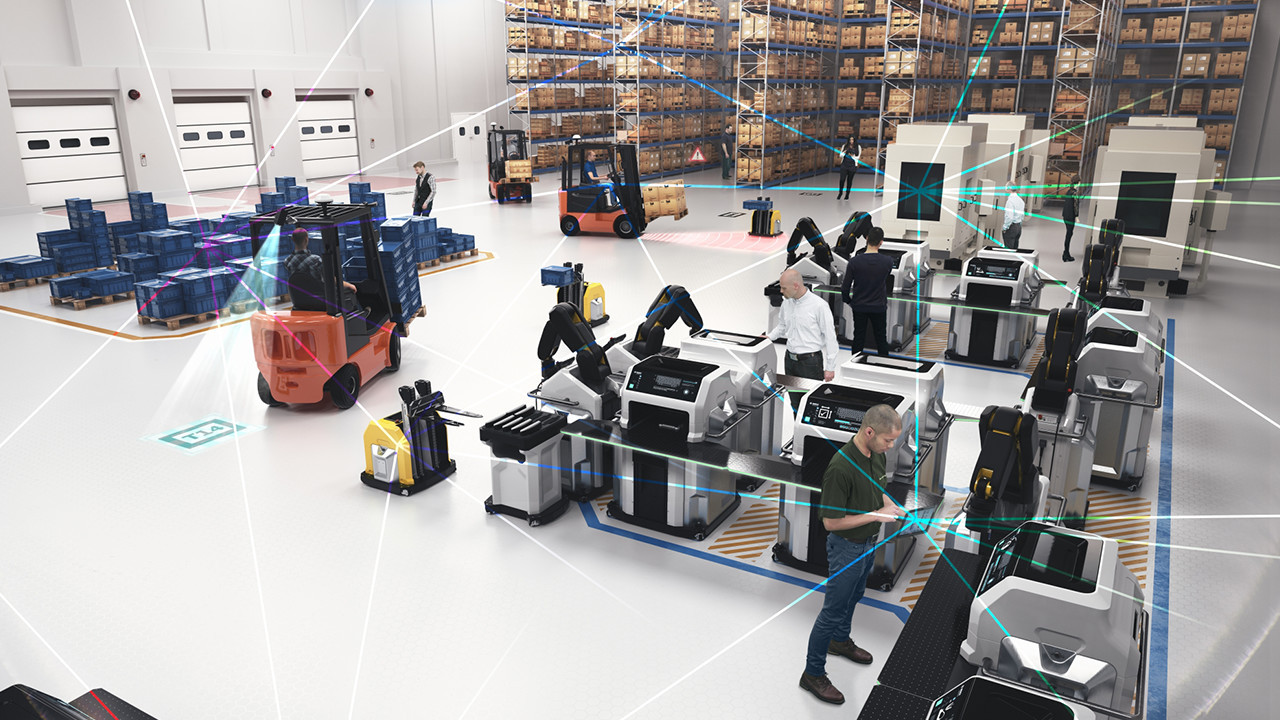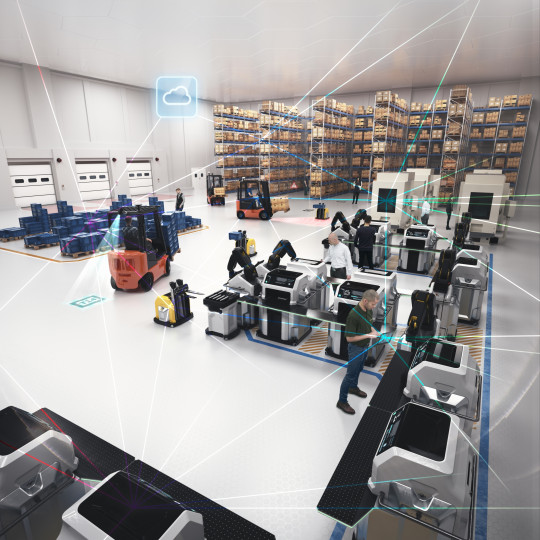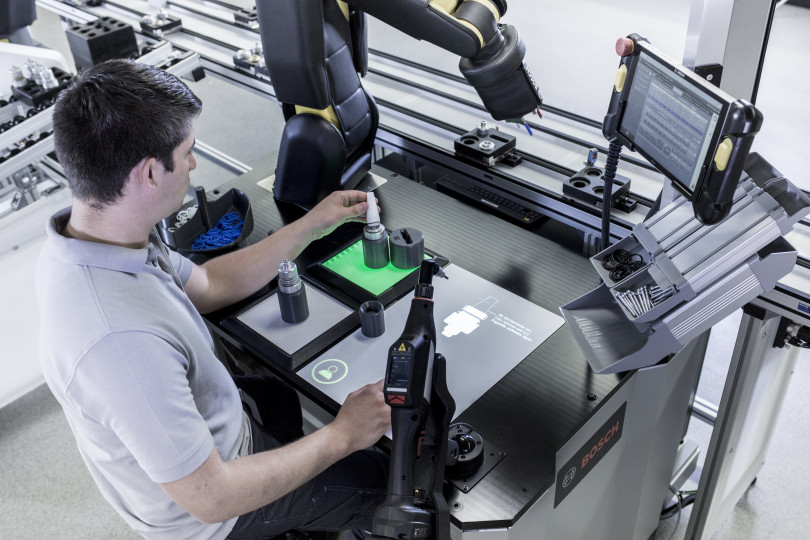Gently, he grasps the metal part and passes it to his colleague. As he does so, he pays close attention to all her movements so he can stop before they bump into each other. Despite his height of 1.75 meters, his movements are effortless and careful, and he doesn’t make a single mistake. “He” is the APAS assistant. This robot can collaborate with people without any physical contact. The robot is part of Workplace 4.0, a concept Bosch was presenting at Hannover Messe 2017. Industrial workspaces of the future are fully connected and focus on the needs of employees. “In the coming decades, everyday work in the manufacturing industry will undergo fundamental changes. People and machines will work more closely together than ever before. Industry 4.0 supports workers and makes their work easier,” said Dr. Stefan Hartung, a member of the board of management of Robert Bosch GmbH whose responsibilities include the Industrial Technology business sector.
A workstation that automatically adapts to the worker
Bosch was introducing Workplace 4.0: a workstation that adapts to the worker. For example, the work surface positions itself at the right height, and workers can receive their instructions as a projection at whatever speed they choose. Digital connectivity and production assistants will make day-to-day work in the industrial sector safer, easier, and more productive. Automotive manufacturers and suppliers are already using collaborative robots such as Bosch’s APAS assistant, but so are producers of consumer goods.
Artificial intelligence supports workers in the production environment
Workplace 4.0 envisions people and machines working closely together, a fact clearly illustrated by the APAS inspector. With the help of a learning image-processing function, the APAS inspector automatically detects when the surface of a production part does not correspond to its specifications. The worker teaches the machine just once regarding how much deviation to tolerate and at what point a part has to be scrapped. Thanks to artificial intelligence, the machine can then apply what it has learned to all subsequent quality checks and carry them out independently. The APAS inspector saves human workers from having to do this monotonous task and ensures a consistently high level of quality for all parts.
Connectivity enables a constant overview of machine data
Connectivity means machine data generated in Workplace 4.0 can be compiled, analyzed, and visualized. Workers can view information on the status of the production environment – for instance, via cycle-time analysis or part and error counters – on a single screen. They can check at any time to see if everything is running according to plan.
Production lines automatically detect the necessary work steps
Nowadays, industrial enterprises and their employees have to be able to quickly respond to new requirements. Bosch’s multi-product line in Homburg, Germany, is a good example. There, Bosch can manufacture 200 different hydraulic modules from more than 2,000 different components. Thanks to connectivity, these components are automatically ordered in time. The modules control the work and driving hydraulics in trucks or tractors, which help do things such as incline loading surfaces or lift a plow. The production line’s nine stations are connected by a smart network. With an RFID chip attached to each workpiece, the stations know how the finished product has to be assembled and what steps are necessary. The work plans required for assembling the hydraulics components are automatically called up and shown on the monitors as a photo or video. The display is customized to each associate’s level of training, and shown in their native language. The aim is to offer associates the best possible support in their work.
Bosch offers everything concerning connectivity from a single source
Bosch has been working with Industry 4.0 solutions for several years now. With more than 270 manufacturing locations around the world, the company has extensive experience in industrial technology and in the use of software, services, and cloud solutions. As a leading user and leading provider, Bosch offers everything for production and the entire supply chain from a single source. The Industry 4.0 offerings for customers include not just software and product solutions for manufacturing and logistics, but also services and consulting, resulting in concepts that are tailored to each customer. With Industry 4.0 solutions, Bosch hopes to generate extra sales of over one billion euros and to save another billion by the year 2020.
Mónika Hack
+36 70 510 5516
Bosch has been present in Hungary since 1898. After its re-establishment as a regional trading company in 1991, Bosch has grown into one of Hungary’s largest foreign industrial employers. In fiscal 2016, its ten Hungarian subsidiaries had a total turnover of HUF 1149 billion and sales of the Bosch Group on the Hungarian market – not counting trade among its own companies – was HUF 238 billion. The Bosch Group in Hungary employs more than 14,200 people (as per January 1, 2017). In addition to its manufacturing, commercial and development business, Bosch has a network of sales and service operations that covers the entire country.
The Bosch Group is a leading global supplier of technology and services. It employs roughly 390,000 associates worldwide (as of December 31, 2016). The company generated sales of 73.1 billion euros in 2016. Its operations are divided into four business sectors: Mobility Solutions, Industrial Technology, Consumer Goods, and Energy and Building Technology. As a leading IoT company, Bosch offers innovative solutions for smart homes, smart cities, connected mobility, and connected manufacturing. It uses its expertise in sensor technology, software, and services, as well as its own IoT cloud, to offer its customers connected, cross-domain solutions from a single source. The Bosch Group’s strategic objective is to deliver innovations for a connected life. Bosch improves quality of life worldwide with products and services that are innovative and spark enthusiasm. In short, Bosch creates technology that is “Invented for life.” The Bosch Group comprises Robert Bosch GmbH and its roughly 440 subsidiaries and regional companies in some 60 countries. Including sales and service partners, Bosch’s global manufacturing and sales network covers nearly every country in the world. The basis for the company’s future growth is its innovative strength. At 120 locations across the globe, Bosch employs some 59,000 associates in research and development.
Additional information is available online at www.bosch.com, www.iot.bosch.com, www.bosch-press.com, www.twitter.com/BoschPresse, www.bosch.hu





